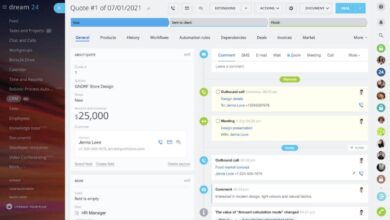AI-Powered CRM Software: 7 Revolutionary Benefits You Can’t Ignore
Welcome to the future of customer relationship management—where AI-powered CRM software isn’t just a luxury, but a necessity. Imagine predicting customer needs before they even speak, automating repetitive tasks, and unlocking insights buried in mountains of data. That’s not science fiction. It’s happening right now.
What Is AI-Powered CRM Software?

AI-powered CRM software integrates artificial intelligence technologies—like machine learning, natural language processing, and predictive analytics—into traditional customer relationship management systems. This fusion transforms CRM from a passive database into an intelligent, proactive engine that drives sales, marketing, and customer service.
Core Components of AI in CRM
The intelligence behind AI-powered CRM software comes from several key technologies working in tandem. These components enable the system to learn from data, make decisions, and improve over time without explicit programming.
- Machine Learning (ML): Algorithms analyze historical customer data to identify patterns and predict future behaviors, such as likelihood to purchase or churn.
- Natural Language Processing (NLP): Enables the CRM to understand and respond to human language, powering chatbots, sentiment analysis, and voice assistants.
- Predictive Analytics: Uses statistical models to forecast outcomes, such as lead conversion rates or customer lifetime value.
How AI Enhances Traditional CRM Functions
Traditional CRM systems store customer interactions and help manage workflows. AI supercharges these functions by adding intelligence and automation. For example, instead of just logging a support ticket, an AI-powered CRM can suggest solutions, prioritize urgency, and even resolve simple queries autonomously.
“AI doesn’t replace CRM—it evolves it. The difference is like comparing a typewriter to a smart word processor with grammar suggestions and auto-complete.” — Gartner Research
Top 7 Benefits of AI-Powered CRM Software
The integration of AI into CRM platforms delivers transformative advantages across departments. From boosting sales efficiency to enhancing customer satisfaction, the benefits are measurable and impactful.
1. Smarter Lead Scoring and Prioritization
One of the most powerful applications of AI in CRM is intelligent lead scoring. Instead of relying on static rules (e.g., job title or company size), AI analyzes hundreds of behavioral and demographic signals to determine which leads are most likely to convert.
- AI considers email engagement, website visits, social media interactions, and past purchase history.
- Dynamic scoring adjusts in real-time as prospects interact with your brand.
- Sales teams can focus on high-potential leads, increasing conversion rates by up to 30% (source: Salesforce State of Sales Report).
2. Hyper-Personalized Customer Experiences
Customers expect personalization. AI-powered CRM software enables businesses to deliver tailored content, product recommendations, and communication at scale.
- AI analyzes customer behavior to suggest the next best action—whether it’s sending a discount offer or recommending a related product.
- Personalization engines can customize email subject lines, landing pages, and even call scripts based on individual preferences.
- According to McKinsey, companies that excel at personalization generate 40% more revenue than those that don’t.
3. Predictive Sales Forecasting
Gone are the days of guesswork in sales forecasting. AI-powered CRM software uses historical data, market trends, and real-time pipeline information to generate accurate sales predictions.
- Forecasts are updated automatically as deals progress or stall.
- AI identifies risks in the pipeline, such as deals with low engagement or long sales cycles.
- Managers gain visibility into potential shortfalls and can take corrective action early.
4. Intelligent Automation of Routine Tasks
Sales and service reps spend nearly 60% of their time on administrative tasks. AI automates these, freeing up time for high-value activities.
- Auto-log calls, emails, and meetings into the CRM using voice and email integration.
- AI schedules follow-ups based on optimal engagement times.
- Automated data entry reduces errors and ensures consistency across records.
5. Enhanced Customer Service with AI Chatbots
AI-powered CRM software integrates with intelligent chatbots that provide 24/7 customer support, resolve common issues, and escalate complex cases to human agents.
- Chatbots use NLP to understand customer intent and respond naturally.
- They access CRM data to provide personalized responses (e.g., order status, account details).
- According to IBM, chatbots can reduce customer service costs by up to 30%.
6. Real-Time Sentiment Analysis
Understanding how customers feel is critical. AI-powered CRM software analyzes customer communications—emails, calls, social media—to detect sentiment and flag potential issues.
- Sentiment analysis helps identify at-risk customers before they churn.
- Support teams receive alerts when a customer expresses frustration or dissatisfaction.
- Marketing can adjust messaging based on audience sentiment trends.
7. Proactive Customer Engagement
Instead of reacting to customer needs, AI enables proactive engagement. The CRM can trigger actions based on predicted behavior.
- Send a renewal reminder when a subscription is about to expire.
- Offer a discount to a customer showing signs of disengagement.
- Suggest a product upgrade based on usage patterns.
How AI-Powered CRM Software Transforms Sales Teams
Sales is one of the biggest beneficiaries of AI integration. From lead generation to closing deals, AI-powered CRM software acts as a co-pilot for sales professionals.
AI as a Sales Assistant
Modern AI-powered CRM platforms include virtual sales assistants that guide reps through every stage of the sales cycle.
- Provides real-time coaching during calls using speech analytics.
- Suggests optimal times to follow up with leads.
- Recommends content (e.g., case studies, demos) based on the prospect’s industry and pain points.
Improving Sales Productivity
Time is money in sales. AI eliminates inefficiencies by automating manual processes and surfacing actionable insights.
- Automated meeting summaries reduce post-call admin work.
- AI highlights key decision-makers in an account based on email patterns.
- Sales reps spend more time selling—up to 40% more, according to Nucleus Research.
Reducing Sales Cycle Length
AI helps shorten the sales cycle by identifying bottlenecks and accelerating decision-making.
- Predicts when a deal is likely to close and flags delays.
- Recommends next steps to move prospects through the funnel.
- Integrates with calendar and email tools to automate scheduling and follow-ups.
Revolutionizing Marketing with AI-Powered CRM Software
Marketing teams leverage AI-powered CRM software to create smarter campaigns, improve targeting, and measure ROI with greater precision.
Dynamic Campaign Optimization
AI continuously analyzes campaign performance and adjusts strategies in real time.
- Automatically shifts budget to high-performing channels.
- Tests subject lines, CTAs, and visuals to determine the best combinations.
- Uses A/B testing at scale to refine messaging.
Customer Journey Mapping
AI-powered CRM software builds detailed customer journey maps by tracking every interaction across touchpoints.
- Identifies friction points in the buyer’s journey.
- Reveals which channels contribute most to conversions.
- Enables marketers to deliver the right message at the right time.
Content Personalization at Scale
AI tailors content for individual users based on their behavior, preferences, and lifecycle stage.
- Personalized landing pages increase conversion rates by up to 50%.
- Email campaigns with AI-driven subject lines see higher open rates.
- Dynamic content blocks adapt based on user profile and context.
AI in Customer Service: Smarter, Faster, More Human
Customer service is no longer just about resolving issues—it’s about building relationships. AI-powered CRM software enhances service quality while reducing response times.
Intelligent Ticket Routing
AI analyzes incoming support requests and routes them to the most appropriate agent or department.
- Considers issue complexity, agent expertise, and workload.
- Reduces resolution time and improves first-contact resolution rates.
- Integrates with knowledge bases to suggest solutions before routing.
Voice and Speech Analytics
AI transcribes and analyzes customer calls to extract insights and improve service quality.
- Identifies common complaints and emerging issues.
- Monitors agent performance and adherence to scripts.
- Provides feedback for training and coaching.
Self-Service Empowerment
AI-powered CRM software enables robust self-service portals where customers can find answers instantly.
- Smart search suggests relevant articles based on query intent.
- Interactive guides walk users through troubleshooting steps.
- Reduces support ticket volume by up to 35% (source: Zendesk).
Key Challenges and Considerations When Implementing AI-Powered CRM Software
While the benefits are compelling, adopting AI-powered CRM software comes with challenges that organizations must address to ensure success.
Data Quality and Integration
AI models are only as good as the data they’re trained on. Poor data quality leads to inaccurate predictions and unreliable insights.
- Ensure data is clean, consistent, and up-to-date across systems.
- Integrate CRM with other platforms (ERP, marketing automation, e-commerce) for a unified view.
- Implement data governance policies to maintain integrity.
Change Management and User Adoption
Employees may resist AI tools due to fear of job displacement or lack of understanding.
- Provide comprehensive training on how AI enhances—not replaces—their role.
- Involve users in the selection and rollout process.
- Highlight quick wins to build confidence and momentum.
Privacy and Ethical Concerns
AI-powered CRM software collects and analyzes vast amounts of personal data, raising privacy and ethical questions.
- Comply with regulations like GDPR, CCPA, and HIPAA.
- Be transparent about data usage and obtain customer consent.
- Audit AI models for bias and fairness, especially in lead scoring and customer segmentation.
Top AI-Powered CRM Software Platforms in 2024
Several leading CRM vendors have integrated advanced AI capabilities into their platforms. Here’s a look at the top contenders.
Salesforce Einstein AI
Salesforce’s AI engine, Einstein, is deeply embedded across Sales Cloud, Service Cloud, and Marketing Cloud.
- Features include predictive lead scoring, automated case classification, and AI-driven email insights.
- Uses natural language processing to analyze customer sentiment.
- Integrates with Slack for real-time collaboration and AI assistance.
Microsoft Dynamics 365 + AI
Microsoft combines its CRM platform with Azure AI to deliver intelligent business applications.
- AI insights for sales forecasting, customer service, and marketing.
- Tight integration with Microsoft 365 and Teams enhances productivity.
- Custom AI models can be built using Power Platform and Azure Machine Learning.
HubSpot CRM with AI Tools
HubSpot has rapidly expanded its AI capabilities to serve SMBs and mid-market companies.
- AI-powered email writer, meeting summaries, and content generation.
- Smart contact scoring and deal prediction.
- User-friendly interface with minimal setup required.
Future Trends in AI-Powered CRM Software
The evolution of AI-powered CRM software is accelerating. Emerging technologies and shifting customer expectations will shape the next generation of CRM platforms.
Generative AI Integration
Generative AI is transforming how content is created within CRM systems.
- AI can draft personalized emails, proposals, and social media posts.
- Chatbots generate human-like responses in real time.
- Tools like GPT-4 are being integrated into CRM workflows for natural language generation.
Emotion AI and Behavioral Prediction
Future CRM systems may detect not just what customers say, but how they feel.
- Facial recognition and voice tone analysis could assess customer emotions during calls.
- Behavioral prediction models will anticipate needs with even greater accuracy.
- Raise ethical questions about consent and data usage.
Hyper-Automation of Customer Journeys
AI will orchestrate end-to-end customer journeys with minimal human intervention.
- From first touch to post-purchase support, every step is optimized by AI.
- Self-healing systems automatically resolve issues before customers notice.
- Seamless handoffs between chatbots, agents, and systems ensure continuity.
What is AI-powered CRM software?
AI-powered CRM software combines artificial intelligence technologies like machine learning and natural language processing with customer relationship management systems to automate tasks, predict behaviors, and deliver personalized experiences at scale.
How does AI improve customer service in CRM?
AI enhances customer service by powering intelligent chatbots, automating ticket routing, analyzing sentiment in real time, and providing self-service options that reduce response times and improve satisfaction.
Can small businesses benefit from AI-powered CRM software?
Absolutely. Platforms like HubSpot and Zoho CRM offer affordable AI features such as smart lead scoring, automated email responses, and AI-driven insights, making advanced CRM capabilities accessible to small businesses.
Is AI in CRM replacing human jobs?
No, AI is not replacing jobs but augmenting them. It handles repetitive tasks, allowing human employees to focus on strategic, creative, and empathetic interactions that AI cannot replicate.
What should I look for in an AI-powered CRM platform?
Look for strong AI features like predictive analytics, natural language processing, automation capabilities, ease of integration, data security, and user-friendly interfaces. Vendor support and scalability are also critical.
The rise of AI-powered CRM software marks a turning point in how businesses manage customer relationships. From smarter sales forecasting to hyper-personalized marketing and intelligent customer service, AI is not just enhancing CRM—it’s redefining it. While challenges like data quality and ethical concerns remain, the benefits far outweigh the risks for organizations willing to embrace this transformation. As AI continues to evolve, the future of CRM will be proactive, predictive, and profoundly human-centered. The question is no longer whether to adopt AI-powered CRM software, but how quickly you can implement it to stay ahead of the curve.
Further Reading:






